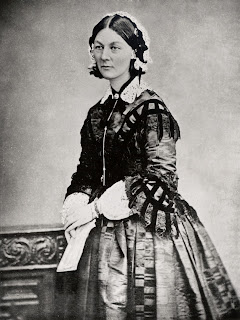Florence Nightingale: The Pioneer of Modern Nursing
- Get link
- X
- Other Apps
Florence Nightingale, born on May 12, 1820, in Florence, Italy, was a remarkable individual whose life's work revolutionized the field of nursing and left an indelible mark on the history of medicine. Her journey from privilege to purpose, unwavering dedication to patient care, and transformative impact on healthcare make her a figure worth admiring and celebrating.
From an early age, Florence Nightingale defied societal norms for women of her time. Instead of conforming to expectations of marriage and domestic life, she pursued a calling to nursing, a profession often viewed with skepticism and disdain. Her family's wealth and connections gave her a classical education, setting her apart from many of her contemporaries.
In 1851, Nightingale embarked on a pivotal journey to Germany, where she trained as a nurse in the Lutheran religious community at Kaiserswerth-am-Rhein. This experience equipped her with the skills and knowledge she would later employ profoundly.
The pinnacle of Florence Nightingale's career came during the Crimean War in 1854 when she and a team of nurses were dispatched to the British Army hospital in Scutari, Turkey. What they encountered was nothing short of a medical catastrophe. Soldiers languished in squalid conditions, plagued by diseases like cholera and typhoid due to inadequate supplies and sanitation. Nightingale, however, was undeterred.
Her tireless efforts to improve conditions are legendary. She introduced innovative sanitary measures, promoted clean water, and enforced strict hygiene practices. Night after night, she would make rounds with a lamp in hand, earning her the affectionate moniker "The Lady with the Lamp." Her dedication to patient care reduced mortality rates significantly and brought hope to the wounded and suffering soldiers.
Nightingale's impact on nursing and medicine extended beyond her actions during the Crimean War. She emphasized the importance of proper nursing training, compassionate care, and rigorous standards. In 1860, she founded the Nightingale Training School for Nurses at St. Thomas' Hospital in London, a pioneering institution that set the gold standard for nursing education.
Florence Nightingale's influence extended to the reform of military hospitals and healthcare in the British Army, and her statistical work contributed to advancements in data analysis. Her legacy remains alive in modern nursing principles, emphasizing skill, knowledge, empathy, and compassion.
In popular culture, Nightingale is revered as a symbol of selflessness and dedication. Her story has been told in countless books, films, and other media as a reminder of the profound impact one person can have on an entire profession and the world. Florence Nightingale's life and work are a testament to the power of compassion and the enduring importance of quality healthcare.
- Get link
- X
- Other Apps



Comments
Post a Comment